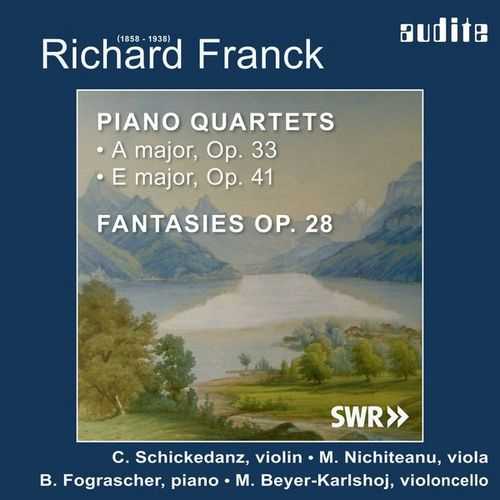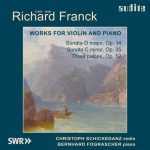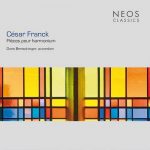
Composer: Richard Franck
Performer: Bernhard Fograscher, Christoph Schickedanz, Marius Nichiteanu, Mathias Beyer-Karlshoj
Audio CD
Number of Discs: 1
Format: FLAC (tracks)
Label: Audite
Size: 585 MB
Recovery: +3%
Scan: cover
Piano Quartet in A Major, Op. 33
01. I. Allegro
02. II. Allegro
03. III. Allegretto
04. IV. Finale
05. Piano Quartet in E Major, Op. 41 “Quartett in einem Satz”: Allegro – Adagio – Allegro – Allegro
Three Fantasies, Op. 28
06. Fantasie No. I, Allegro molto con fuoco (C Minor)
07. Fantasie No. II, Allegro molto con fuoco (C Minor) Adagio [A-Flat Major]
08. Fantasie No. III, Allegro non troppo. Più moto. Tempo I. Più moto. Presto. Prestissimo (C Major)
Richard Franck was born in 1858, son of Eduard Franck, also a composer of distinction although neither of their names are well known now. Over the past few years the German record label Audite has devoted several issues to the music of both father and son, with the help of their descendants – the latter playing an important role, as I believe much of the music of Eduard Franck (a seemingly modest man, despite his exceptional gifts) remains in manuscript and he displayed little interest in having it published. If one wanted an example of hereditary genius these two composers would appear to be an a good one: admittedly both were rather conservative for their respective times, eschewing the more modern musical developments followed by their contemporaries but they share an apparently limitless fund of beautiful melody, an exquisite hand at scoring and what seems to be an innate gift for creating satisfying musical structures, logical but not lacking in imagination; for all their respect for the received tradition, nothing I have heard by either composer sounds stale or trite.
If you haven’t heard any of Richard Franck’s music, the radiant piano quartet in A major could well be the ideal place to start. A substantial work in four movements, it contains music of rapt lyricism – the opening `Allegro’ is a predominantly congenial piece, its flowing opening melody suspended over a lilting rhythm in the piano; this gently dancing quality and rhythm will inform much of the consummately crafted sonata form movement that follows. It precedes an exquisite `adagio’, whose primary theme resonates in the mind long after the work has finished playing – harp-like accompanying figuration in the piano and pizzicato strings lends this luminous movement a decided song-like quality, one that is maintained even in the contrasting central section with its somewhat archaic sounding fugal writing. It all really is quite magical in its effect. In place of a scherzo there is a gentle allegretto in which the spirit of the ballroom is not far away. It is succeeded by an impassioned `allegro’ finale, the exuberance of which occasionally subsides into more romantically inclined secondary material. Of all the works I have heard by Richard Franck, I have to say that this wonderfully conceived and executed piano quartet is the one that draws me back most often.
His second piano quartet, in E major, is a strikingly contrasted work in scale and structure if not in idiom. Indeed, it occupies a similar sound world to its predecessor though there is more ardour here and, perhaps, less radiance; the soaring primary theme emerges from dark hued opening bars in the bass registers of the instruments; the contrasts of light and shade are more pronounced through the short course of this work. It is that conciseness of expression that marks this quartet out as so different to the earlier work – the whole piece lasts a mere 8’48” and is in one movement, though the tempo markings suggest that the traditional four-part series is contained within its span*: the final allegro section acts as a sort of recapitulation of the material presented at the start of the work. It was certainly well-received by the critics in Franck’s lifetime, the liner notes quoting two contemporary reviews of performances – “Full of energy, temperament and refinement, the perfectly realised conception of this interesting work was communicated to us.”**
The disc concludes with three fantasies for solo piano, originally conceived independently but grouped together for publication as his opus 28. The set is headed by a quotation from Goethe and the individual pieces each bear a poetical superscription too. Franck was renowned for his mastery of the piano and his performances drew praise; it shows in these fantasies, which he performed himself in public and which contain passages fair set to trip up the unwary concert pianist. They demand sensitivity as well as technical ability if their über-Romantic sensibilities are to be given their due for none of these works are empty display-pieces. Bernhard Frograscher proves himself to be well up to the task in hand on both fronts.
He is just one of four musicians here who all deliver pretty much perfect renditions of Franck’s music; throughout they display both their sensitivity to and their affection for the composer’s sophisticated but always warm-hearted writing. The sound quality is equally fine, which all adds up to a winning combination.
Heartily recommended and fully deserving of the full five stars on all counts – if I could award extra stars I would.



